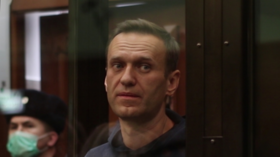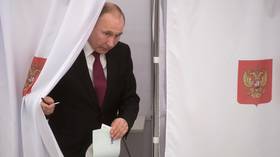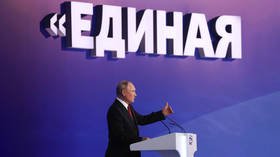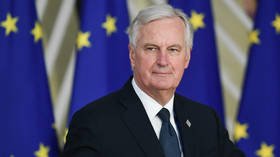Alexey Navalny is correct about anti-Russia sanctions: His own situation proves they've achieved nothing & are counterproductive

Few countries face as many sanctions as Russia. Crimea, supposed election meddling and alleged human-rights abuses have all provided pretexts for harsh measures but, while they make foreign politicians feel good, what has changed?
The world's most prominent detainee – ironically only among those who forget about the persecution of Julian Assange – has given a long interview to the New York Times. For Moscow's critics, Alexey Navalny is a political prisoner. In my view, he is as well, even if I am unsympathetic to his politics and disagree with Amnesty International's misguided definition of him as a 'prisoner of conscience.'
One thing, however, seems clear. Very much unlike the West's political prisoner, Assange – who has endured far more severe prison conditions – Navalny is able to communicate with the outside world, as the NYT acknowledges. In fact, the Russian anti-corruption activist and would-be political candidate has been able to provide the newspaper with 54 handwritten pages of answers to its questions.
His statements, moreover, are clearly uncensored. They are scathing about Russia's current elites, including President Vladimir Putin, and predict an approaching end of their rule. Make of that what you will, but it is, obviously, not the signature style of 'totalitarianism.' Never mind some popular publicists such as journalist Masha Gessen, perhaps still bitter about entirely misreading and underestimating Vladimir Putin, who can't let go of this accusation.
In his interview, Navalny raises several important issues. So, let's pick out one that may surprise some of his supporters in the West: He affirms that he is critical of Western sanctions on Russia; not in principle, it is true, but nonetheless harshly. This does, however, fly in the face of previous entreaties from his entourage, including 'economic adviser' Vladimir Milov, who have lobbied for the penalties.
As Navalny sees them, sanctions hit Russia with broad strokes and punish ordinary Russians. He calls for measures that would instead target only those he denounces as oligarchs. At the same time, he is uncertain if threats of more embargoes could protect him personally: He believes they are potentially deterring but could also provoke defiance: once you try to force me, I'll make sure to show you that you can't.
Navalny's position on the penalties is curious because it either is badly informed or, more likely, reflects an attempt to play to a Russian audience. In reality, a substantial share of Western sanctions do, actually, target individuals, even if they may not always be the ones Navalny personally would like to see suffer the most. In fact, whether honestly or not, a 2019 report by the US Congressional Research Service already claimed that both America and the European Union were trying to focus the sanctions impact on elites and spare the common man (and woman).
Whatever Navalny's reasons for getting it wrong, his view on sanctions is still interesting. Especially if we think about the underlying issue: What role has the policy played in the rocky relationship between Russia and the West? And what role should they play (or not)?
Also on rt.com Russian Communist politician calls for Putin-supporting ruling party to be declared EXTREMIST ORGANIZATION ‘just like ISIS’Common ground first. Whatever side you happen to be on, you have to agree, the West and Russia do not like each other very much these days. There's no need to add yet another attempt to adjudicate who's to blame the most for that but, if you absolutely must know what this author happens to believe, this is one of the few issues that I'd blame on both-sides, with gusto.
Instead, let's focus on the consequences. For both Russia and the West, the degree of open, cranky animosity that now prevails, compared with the 1990s, when, incidentally, the relationship was also rotten, just in ways that short-sighted Western elites found comfortable is, of course, dangerous and costly. On one side, it constantly poses unnecessary risks of clearly unaffordable escalation; on the other, it exacts a steadily growing price in missed opportunities for urgently needed cooperation.
Against this background, Western sanctions on post-Soviet Russia have played a complicated, ambiguous role. They did not start with the Ukraine crisis of 2014 but, roughly, a decade earlier. The official reasons given by the US and the EU go far beyond Ukraine as well, including a whole register of sins such as alleged Russian electoral interference (a topic that often provokes bizarrely hysterical responses, perhaps best diagnosed as Russia Rage), cyber-attacks, or purported human rights issues. Russia, meanwhile, has answered with counter-sanctions.
Yet the most important factor in escalating the West's use of sanctions has clearly been the conflict over Ukraine. Here, the key point to note is that time has passed: it is 2021, and seven years after the onset of severe Ukraine-related sanctions by both the USA and the EU, we need not speculate but can observe actual improvements to the situation – or their absence.
Naïve and irresponsible expectations by some Cold War re-enactors in the West (We'll squeez'em till they comply or collapse!) have, unsurprisingly and fortunately, been proven utterly wrong. Those who still cling to such illusions or bad-faith spin, for instance at NATO lobby group The Atlantic Council, are now taking refuge in brittle counter-factuals: Having nothing to show in terms of Russia's actual behavior, they simply (and baselessly) fantasize that, without sanctions, Russia would have been more "aggressive."
But, once your argument is based on a big, fat what-if, maybe you'd be better off writing novels than White House policy?
In terms of economic impact, it is impossible to more than guess, more or less systematically, how much of the Russian economy's recent trajectory is due to sanctions and how much to other factors. Yet that is not even the real problem. What is even harder to figure out is the relationship between economic effects and politics. In fact, no one knows and everyone speculates, usually in accordance with personal bias.
But there are things we can plainly observe, such as the fact Russia has not budged on Ukraine, Syria, or Libya; Putin's government is still there; conversely, neither Navalny nor [protest artists] Pussy Riot are in charge. Instead, Navalny is in prison and facing fresh charges. In general, Russia's rulers show no sign of being intimidated or of changing course.
Thus, there can be no reasonable doubt that skeptics who point to the cost of sanctions, the lack of desired results, and to the host of unintended consequences are much more realistic than the sanction brigade and its think-tank racket proponents.
So, in an ideal, rational world, should Western sanctions on Russia simply be given up as dangerous, costly, useless, and probably counterproductive? Yes. But only, and this is crucial, in such a world. And that is, alas, not where we live: The paradox of these sanctions is that they are a failure, like quite a few things the West has been trying its hand at recently, but they are still needed. And the reason for that perverse outcome has little to do with Russia and much with the West. In a nutshell, sanctions help contain the most volatile and aggressive actors – in the West.
Here, the point to recall is that the West has not really been, of course, one thing, but a complicated, often tense coalition. It has included those who want less frosty relations, such as France's Emmanuel Macron, Germany's Angela Merkel, or – with all their awful flaws – America's Donald Trump and now, apparently, even Joe Biden. It has also featured "pro-Russian" EU authoritarians in Hungary and anti-Russian EU authoritarians in Poland. Add pragmatists who have never liked the costs of sanctions, especially in the EU's south, but by no means only.
In sum, Western sanctions on Russia are a classical fudge, a smallest common denominator, a textbook foul compromise. Wouldn't that be yet another reason to get rid of them? No, actually, it would not. Because if you simply took them away, you would run the risk of a massive backlash by those who may not quite be able to imagine a (regional? global?) war with Russia yet, but whose deepest longings point exactly into that black hole of geopolitical unreason.
What, then, is to be done? That question touches on another, bigger issue, namely, how to deal with the current high level of tension in general.
You do not have to be a bleeding-heart "appeaser" to understand that, when there's trouble, the best policy is not to stop talking. On the contrary, especially when there's trouble, you must keep talking (not only, but also). It will be frustrating, it may go on for a long time before it works, and you won't get any promises (at least not ones you should believe) as to when it finally will. Put differently: to keep talking takes psychological adults, not impatient foreign policy toddlers and pandering public intellectuals, pampered for too long by a temporary "unilateral moment," the end of which was always predictable.
Also on rt.com Fake poisoning or genuine attempt? Russian TV documentary examines evidence of alleged attack on opposition figure Alexey NavalnyIn the USA, to some extent, fortunately, this need for talk under troubled circumstances, has become more acknowledged again than under the narcissist-in-chief Barack Obama: Both Trump and Biden have at least tried to re-open summitry with Russia – and, on this matter, both have been right.
In the EU, meanwhile, attempts to do the same – last promoted by France and Germany – have, for now, been blocked by a coalition of the strictly unreasonable, a sign of the EU's misshapen architecture, especially after the post-2004 enlargements. But hope never dies.
The task now is to slowly, carefully climb out of a sanctions regime that is an obvious, empirical failure at its declared purpose – making Russia do what the West wants. If, and only if, the garbage of sanctions was, at long last, to be recycled into fuel for restarting genuine diplomacy, the old and vital art that isn't ashamed but proud of compromise, then the sanctions snake oil would end up serving in a real cure.
Like this story? Share it with a friend!
The statements, views and opinions expressed in this column are solely those of the author and do not necessarily represent those of RT.
The statements, views and opinions expressed in this column are solely those of the author and do not necessarily represent those of RT.
















